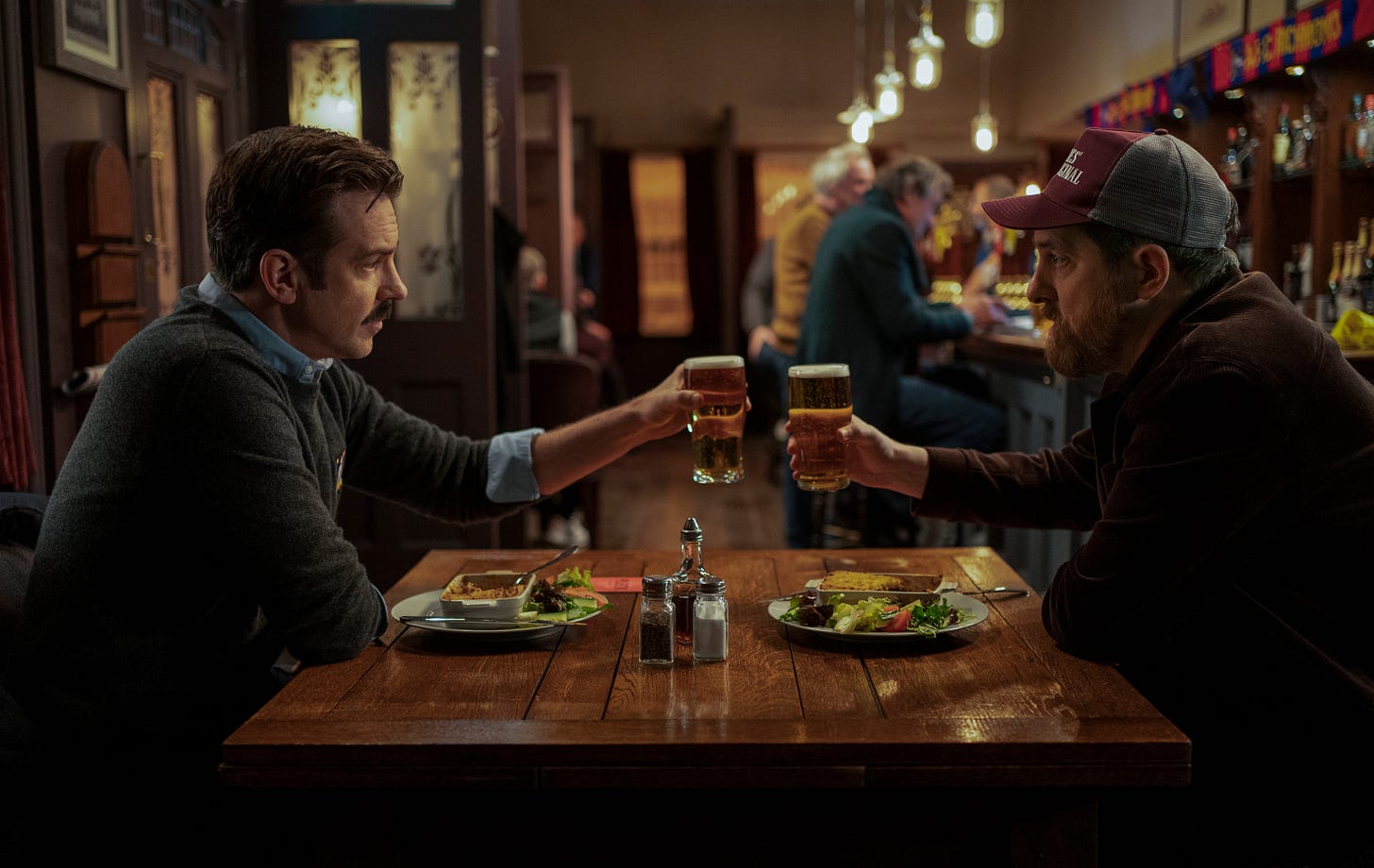What Ted Lasso Can Teach Us About Dining Out
Lessons from Kansas City
Imagine for a second dining out with Ted Lasso. From the divey-est of dives to the finest of fine dines, it’s difficult to picture yourself having a bad time. If you've watched the show, you may have come to love Ted for his ability to see the positive in any situation and his unflappable nature when faced with challenges. As your dinner companion, Ted would charm the waitstaff with a friendly "Howdy!" and then break the ice with a wholesome tale from his hometown, Kansas City.
What makes a dining experience enjoyable may vary from person to person, but we all want our expectations to be met. My wife, Jules, teases me when I begin a sentence with “For me, …” as though I’m saying “Pay attention now, something profound might follow.” But here I go: For me, to sit in a restaurant and have strangers cook and serve us delicious food, is a luxury. However, when I talk to others about dining out, I often hear complaints and negativity. Watching Ted Lasso makes me wonder if the problem is with the dining experience itself, or whether we can change our attitudes toward it. Are we really bringing our best selves to the table?
I have a friend like Ted and, as you can imagine, spending an evening in a restaurant or crowded bar with him is always a delight. Andrew exudes Ted Lasso Energy, treating the waitstaff with warmth and winning them over with his charm. He's quick to ask for a bucket of his favourite beer on ice, “To save them running back and forth, you know,” and takes their menu recommendations to heart. Although he tends to frequent the same table in the same dive bar, like Ted (the Vasco Da Gama Tavern in Green Point), I've seen him work his magic elsewhere too.
Having worked in restaurants before, I've witnessed the power of a familiar face flashing a friendly smile and greeting staff by name. The room's temperature shifts, and a sense of welcome washes over everyone. As Matthew McConaughey might have said at some point, but probably didn’t: “When you show up with the attitude that there’s no place you’d rather be, you may just end up being right.”
We've all had dining experiences where our expectations were not met. I used to respond by muttering under my breath and growing impatient. However, my wife Jules shared her philosophy of "protecting the sanctity of the dining experience" — although she may not have called it that. Essentially, it’s the idea that if you have something negative to say, why not wait a few days? We're out to have a good time, and expressing negativity in that moment can ruin the experience for everyone.
Recently, I listened to an FT Weekend podcast about fine dining after the announcement that Noma, the world's top restaurant, would close in 2024. Food critic Tim Hayward spoke about the bizarre reality of 14-course tasting menus and, for a journalist that has experienced hundreds of Michelin Starred meals, he ended with a surprising answer to the question of what makes a restaurant good:
“For me, it’s hospitality… The magic comes in when you walk into a place and they greet you at whatever level, whatever kind of place it is and they say, “You’re in my hands now, and while you’re in my hands, I’m going to make sure everything is as lovely for you as I can make it, is that okay with you?”, and you go, “Yeah, that’s okay with me”. The amount of money that changes hands, the quality of food that’s delivered, is not that important. I’ve come in for the evening and I go home thinking: Those people really looked after me and that was wonderful. That’s it, that’s what you want. Hospitality with a small h.”
Perhaps Tim Hayward makes a counterpoint to mine: that hospitality - with a small h - should stand alone. But there’s a reciprocity to the relationship that I think we’re missing. And I wouldn’t be the first person to suggest that if we have a desire to be treated better, maybe we should be the one that goes first.


Agree 100%.
I regularly think about this when travellers complain about their flight experience.
It is unreal that:
1) we are able to fly through the air
2) there is a cushioned seat bolted in to the floor
3) you get a warm meal
4) there are luxuries like movies on demand, a personal tv screen, chargers, pillows, gin & tonics etc.
I try to remind people of this…
I’m from Kansas City, and I visited home last week. The interactions I had were so refreshing. “Hospitality” is the right word for it but also courtesy, compassion, and calmness. One night at dinner, when the server came by with the check, I stopped her to say how pleasant it’d been to talk to her during our meal, and how you’d never have a dining experience like that where I live now, in New Jersey.
Thanks for sharing this, Nic!
Ted Lasso definitely captures the midwestern charm, but (just as a PSA), no one from KC has Ted’s accent (including Jason Sudeikis), and no one says “howdy.”